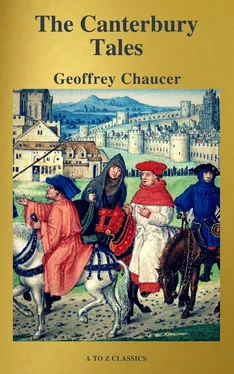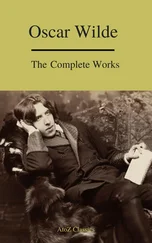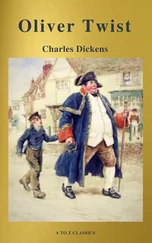Kan clepen ‘watte’ as wel as kan the Pope.
But who so koude in oother thyng hym grope,
Thanne hadde he spent al his plilosophie;
Ay ‘questio quid juris’ wolde he crie.
He was a gentil harlot and a kynde,
A bettre felawe sholde men noght fynde;
He wolde suffre, for a quart of wyn,
A good felawe to have his concubyn
A twelf-monthe, and excuse hym atte fulle —
Ful prively a fynch eek koude he pulle.
And if he foond owher a good felawe,
He wolde techen him to have noon awe,
In swich caas, of the erchedekeness curs,
But if a mannes soule were in his purs;
For in his purs he sholde ypunysshed be,
‘Purs is the erchedekenes helle,’ seyde he.
But wel I woot he lyed right in dede;
Of cursyng oghte ech gilty man him drede —
For curs wol slee, right as assoillyng savith —
And also war him of a Significavit.
In daunger hadde he at his owene gise
The yonge girles of the diocise,
And knew hir conseil, and was al hir reed.
A gerland hadde he set upon his heed
As greet as it were for an ale-stake;
A bokeleer hadde he maad him of a cake.
With hym ther rood a gentil Pardoner
Of Rouncivale, his freend and his compeer,
That streight was comen fro the court of Rome.
Ful loude he soong ‘com hider, love, to me.’
This Somonour bar to hym a stif burdoun,
Was nevere trompe of half so greet a soun.
This Pardoner hadde heer as yelow as wex,
But smothe it heeng as dooth a strike of flex;
By ounces henge hise lokkes that he hadde,
And therwith he hise shuldres overspradde;
But thynne it lay by colpons oon and oon.
But hood, for jolitee, wered he noon,
For it was trussed up in his walet.
Hym thoughte he rood al of the newe jet,
Dischevele, save his cappe, he rood al bare.
Swiche glarynge eyen hadde he as an hare.
A vernycle hadde he sowed upon his cappe.
His walet lay biforn hym in his lappe
Bret-ful of pardoun come from Rome al hoot.
A voys he hadde as smal as hath a goot,
No berd hadde he, ne nevere sholde have,
As smothe it was as it were late shave,
I trowe he were a geldyng or a mare.
But of his craft, fro Berwyk into Ware,
Ne was ther swich another Pardoner;
For in his male he hadde a pilwe-beer,
Which that he seyde was Oure Lady veyl;
He seyde, he hadde a gobet of the seyl
That Seinte Peter hadde, whan that he wente
Upon the see, til Jesu Crist hym hente.
He hadde a croys of latoun, ful of stones,
And in a glas he hadde pigges bones;
But with thise relikes whan that he fond
A povre persoun dwellyng up-on-lond,
Upon a day he gat hym moore moneye
Than that the person gat in monthes tweye,
And thus with feyned flaterye and japes
He made the persoun and the peple his apes.
But trewely to tellen atte laste,
He was in chirche a noble ecclesiaste;
Wel koude he rede a lessoun or a storie,
But alderbest he song an offertorie,
For wel he wiste, whan that song was songe
He moste preche, and wel affile his tonge;
To wynne silver, as he ful wel koude,
Therfore he song the murierly and loude.
Now have I toold you shortly in a clause
Thestaat, tharray, the nombre, and eek the cause
Why that assembled was this compaignye
In Southwerk, at this gentil hostelrye,
That highte the Tabard, faste by the Belle.
But now is tyme to yow for to telle
How that we baren us that ilke nyght
Whan we were in that hostelrie alyght,
And after wol I telle of our viage,
And all the remenaunt of oure pilgrimage.
But first I pray yow, of youre curteisye,
That ye narette it nat my vileynye,
Thogh that I pleynly speke in this mateere
To telle yow hir wordes and hir cheere,
Ne thogh I speke hir wordes proprely.
For this ye knowen also wel as I,
Who-so shal telle a tale after a man,
He moot reherce as ny as evere he kan
Everich a word, if it be in his charge,
Al speke he never so rudeliche or large;
Or ellis he moot telle his tale untrewe,
Or feyne thyng, or fynde wordes newe.
He may nat spare, al thogh he were his brother,
He moot as wel seye o word as another.
Crist spak hym-self ful brode in Hooly Writ,
And, wel ye woot, no vileynye is it.
Eek Plato seith, who so kan hym rede,
The wordes moote be cosyn to the dede.
Also I prey yow to foryeve it me,
Al have I nat set folk in hir degree
Heere in this tale, as that they sholde stonde —
My wit is short, ye may wel understonde.
Greet chiere made oure hoost us everichon,
And to the soper sette he us’anon.
He served us with vitaille at the beste;
Strong was the wyn, and wel to drynke us lestel
A semely man oure Hooste was withalle
For to been a marchal in an halle.
A large man he was, with eyen stepe,
A fairer burgeys was ther noon in Chepe;
Boold of his speche, and wys, and well ytaught,
And of manhod hym lakkede right naught.
Eek therto he was right a myrie man;
And after soper pleyen he bigan,
And spak of myrthe amonges othere thynges,
Whan that we hadde maad our rekenynges,
And seyde thus: “Now lordynges, trewely,
Ye been to me right welcome hertely,
For by my trouthe, if that I shal nat lye,
I saugh nat this yeer so myrie a compaignye
Atones in this herberwe, as is now.
Fayn wolde I doon yow myrthe, wiste I how —
And of a myrthe I am right now bythoght
To doon yow ese, and it shal coste noght.
Ye goon to Caunterbury, God yow speede —
The blisful martir quite yow youre meede —
And wel I woot, as ye goon by the weye,
Ye shapen yow to talen and to pleye,
For trewely, confort ne myrthe is noon
To ride by the weye doumb as stoon,
And therfore wol I maken yow disport,
As I seyde erst, and doon yow som confort;
And if yow liketh alle by oon assent
For to stonden at my juggement,
And for to werken as I shal yow seye,
To-morwe, whan ye riden by the weye,
Now, by my fader soule that is deed,
But ye be myrie I wol yeve yow myn heed!
Hoold up youre hond, withouten moore speche.”
Oure conseil was nat longe for to seche —
Us thoughte it was noght worth to make it wys —
And graunted hym, withouten moore avys,
And bad him seye his voirdit, as hym leste.
“Lordynges,” quod he, “now herkneth for the beste,
But taak it nought, I prey yow, in desdeyn.
This is the poynt, to speken short and pleyn,
That ech of yow, to shorte with oure weye,
In this viage shal telle tales tweye,
To Caunterburyward I mene it so,
And homward he shal tellen othere two,
Of aventures that whilom han bifalle.
And which of yow that bereth hym best of alle —
That is to seyn, that telleth in this caas
Tales of best sentence and moost solaas —
Shal have a soper at oure aller cost,
Heere in this place, sittynge by this post,
Whan that we come agayn fro Caunterbury.
And for to make yow the moore mury
I wol my-selven goodly with yow ryde
Right at myn owene cost, and be youre gyde.
And who so wole my juggement withseye
Shal paye al that we spenden by the weye.
And if ye vouchesauf that it be so,
Tel me anon, withouten wordes mo,
And I wol erly shape me therfore.”
This thyng was graunted, and oure othes swore
With ful gald herte, and preyden hym also
That he wolde vouchesauf for to do so,
And that he wolde been oure governour,
And of our tales juge and reportour,
Читать дальше












